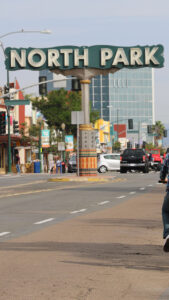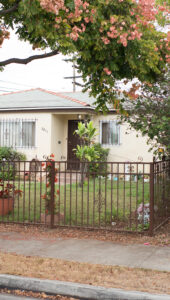San Diego Neighborhood Guides
About San Diego
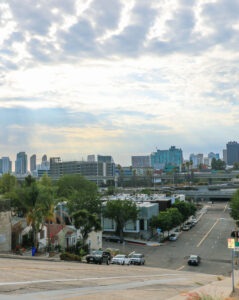
Wax up those surfboards and grab your sunscreen—you're headed to Cali, brah! San Diego, California, has been dubbed "America's Finest City," and it's easy to see why. A near-perfect climate, 70 miles of pristine Pacific coastline, fantastic scenery, countless family-friendly activities, outdoor adventures aplenty, gnarly surfing, and world-class golfing all make an assignment to San Diego one that military families cherish and help explain why so many choose to retire in the area.
Southern California is known for both mellow weather and mellow people. Inland towns can experience warmer temperatures, but the coastal regions maintain mild 65- to 80-degree temperatures year-round, with breezes coming in from the Pacific. The "May Gray" and "June Gloom" that the coastal regions "suffer" refer to the fog that rolls in during the early summer months. The fog keeps daytime temperatures low until the sun burns off in the late afternoon. Otherwise, the area maintains a glorious, Mediterranean-like climate with continual ocean swells ideal for epic surfing.
Speaking of surfing, we should probably take a second to talk about surf culture. San Diego is known for some of the best beaches for surfing, and a reverence for the sport's history is woven into everything from the food to the local dialect. Flip flops, shaggy hair, and untucked shirts are the norm. You'll often find locals taking lunch breaks on the beach or families catching a sunset after dinner. Whether you're a maverick or new to surfing, take a second to acquaint yourself with local surf etiquette before shredding. Be realistic about your abilities and find a beach that suits your skills. Also, invest in a wetsuit. This is not the Atlantic, and the water is chilly!
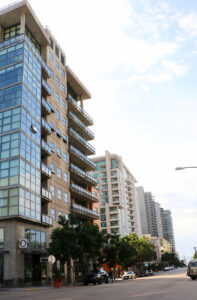
San Diego is home to several Navy, Marine Corps, and Coast Guard bases and is a large metropolitan area with a population of almost 1.4 million people. The central areas are densely populated, and a robust tourism industry adds to the congestion. While commuting is an issue, the roads and highways are well-planned, and bottlenecks are infrequent. Most San Diegans live by a "20-minute rule," which means they limit their commutes (or travel time to the beach) to 20 minutes or less. If you can't live near the water, try to situate yourself close to a freeway. Average commute times in San Diego are 25 to 30 minutes. Traffic does pick up considerably during tourist season (May through September), and parking can be troublesome near most destinations and beaches. Touring up and down the coast is made easy by the Coaster Train and the Amtrak Surfliner.
If you're not enjoying the gorgeous beaches and picturesque hiking trails, you can try the San Diego Zoo and Safari Park, LEGO-LAND, Balboa Park, the USS Midway Museum, or the Birch Aquarium. And don't forget that San Diego has a dining and beer scene that is the stuff of any respectable epicurean's dreams. Some of the most fantastic tourist spots on the West Coast are within a few hours' drive from San Diego. Temecula's Wine Country, Palm Springs, Borrego Springs, Disneyland in Anaheim, Los Angeles, and Joshua Tree National Park are all just an hour or two away. The Pacific Coast Highway starts at Dana Point in Orange County and can take you as far as your heart desires to up the scenic California coastline. You can head into the nearby mountains for hiking, camping (or glamping), or exploring the desert. Mexico is just across the border to the south, and you can fill your cultural cup—and your stomach— in Tijuana, Ensenada, or Valle de Guadalupe. Pick a destination and go on an adventure! The abundance of "memory-making" excursions is one of California's most incredible perks—and certainly something you won't experience at many other duty stations.
FINDING A HOME
The first step in choosing where to live is to determine your priorities. Some folks need a little breathing room and look to live inland, away from some of the hustle and bustle. Others are okay with sacrificing space and privacy for living close to all the action of downtown or near the water. Be realistic with your priorities and sensitive to your budget. Once you determine your priorities, an experienced real estate agent can help you narrow down candidates for your new neighborhood!
Pro tip: If you come armed with this info before chatting with a real estate agent, they’ll have an enormous leg up in helping you find a home quickly. Efficiency and knowledge are crucial in this hyper-competitive real estate market.
HOME SIZE
Typically, Southern California homes are between two and three bedrooms, max. Most are built in the Spanish stucco style with red-tiled roofs. Some of the newer subdivisions have been constructed with modern families in mind, meaning you can find more than three bedrooms and slightly larger yards. House sizes shrink, and prices increase as you get closer to the water. Homes closer to the coast probably won’t have central A/C, but if you’re inland, you will want home cooling. If living close to the beach is a priority for you, don’t be afraid to look into condos or townhouses, many of which have pools and community amenities that can supplement indoor living space. The weather in San Diego is so lovely that you’ll want to be outside year-round anyway.
HOME PRICE
San Diego is a pricey market, and the cost of living in California is higher than the national average. There is also a competitive real estate market, where bidding wars and above-asking-price cash offers are common. Home values change rapidly in this market, so ask your real estate agent for local market analysis. Generally speaking, you’ll be paying more per square foot the closer you are to the water. Many factors unique to California could potentially price you out of a neighborhood before you even start touring homes, so let’s look into what you need to know.
MELLO-ROOS
You’ll need to get acquainted with a tax called Mello-Roos if you plan on buying a home in California. This Mello-Roos tax is above and beyond your typical property tax and can sometimes be upwards of $500 per month. The fees add up, and you could be spending well above your BAH. Long story short, some communities have the designation of a Community Facility District (CFD), and they impose an additional property tax to help pay for schools, roads, utilities, and services like police and fire protection. Again, an experienced real estate agent can help.
UTILITIES
Be sure to identify whether or not your potential home has air conditioning. Being near the coast gets you the coastal breezes, so most people say that not having A/C here isn’t a deal-breaker. Pay Keep in mind that utility bills for homes off post can routinely exceed $300. Pay close attention to this as you search farther inland.
HOAS
Homeowners Associations are the norm for most subdivisions, but also be on the lookout for community and city-wide HOAs. That sparkly, new neighborhood with a fitness center, pool, and meticulously kept golf course is paid for somehow...
SCHOOLS
Most servicemembers without children will probably just want to be as close to the water as possible. Those with children will likely look at communities farther inland. Online school ratings will not always show the entire picture, so it’s essential to do more extensive research. Look at the school’s or district’s report card from the California Department of Education. Interview potential schools. Take into account all factors that could influence test scores but aren’t necessarily reflective of the quality of education (i.e., a high percentage of students whose primary language isn’t English). There are several options for education models in California, and we’ve identified some schools in each area that military spouses recommend.
TRADITIONAL PUBLIC SCHOOLS
The California Department of Education operates traditional public schools. Students who reside within a school zone can attend their neighborhood school. Still, California public schools also offer open enrollment and intradistrict choice, meaning your child can attend any school inside or outside the district upon approval and space availability. Students at low-performing schools can also attend a different school in their district. Many public high schools are considered “schools of choice,” where any student in the district can select
which school to attend. A lottery is held if there are too many applications. Some schools are fantastic and offer truly incredible student experiences—you won’t find surfing as an elective at many other duty stations.
CHARTER SCHOOLS
Charter schools are public schools that have private oversight and come in various educational models. The charter schools can offer traditional, site-based instruction (meaning your child goes to a classroom daily), independent study programs (parents are provided the curriculum and materials for homeschooling), or a hybrid of both models (one day of classroom instruction per week). Charters have zoned districts, where your child may attend if you live within the district, or you can also take advantage of California’s intradistrict choice to apply for a school in another district.
MAGNET SCHOOLS
A magnet school is a school in the local public school system that operates under the same oversight and school board as public schools. Magnet schools typically focus on STEM (Science, Technology, Engineering, and Math), the arts, or vocational paths. There are many Montessori magnet schools in California. Magnet schools typically accept a small percentage of applicants. Therefore lotteries are common, but living within the school’s assigned district can help with acceptance.
PRIVATE SCHOOLS
As always, you may opt for a private education for your child if the neighborhood schools don’t excite you. Private schools can be religious or nonsectarian and are famous for preschool. Private schooling is a pricey option but viable for some.
Looking at relocating?
Enter your information below and we will reach out to help the process.
Nearby Neighborhoods
Nearby Neighborhoods
Central San Diego
About
Central San Diego County encompasses most of the city of San Diego, as well as Point Loma and Coronado. Though most of the inhabitants are transplants, it is a requisite for newcomers to embody the mellow, SoCal attitude. San Diego is well-known for its breweries, celebrity chef restaurants, cultural offerings, events, nightlife, and beaches. The weather is amazing, with steady, mild temperatures, a cool ocean breeze, and endless days of sunshine.
San Diego is home to the San Diego Padres (MLB). This area is also a huge tourist draw, and it is easy to see why! There are countless things to do and see, including the famous San Diego Zoo, Balboa Park (with several museums and galleries), the historic Gaslamp District, Point Loma’s tide pools, the Cabrillo National Monument, and La Jolla Shores. A plethora of outdoor activities are also at your fingertips, and the weather is so amenable you have no excuse to be indoors!
Neighborhood Feel
Young professionals, students, and the military (singles and couples without kids) flock to this area for the big-city buzz. There are “true-born” locals, but the area is highly transient, and transplants hail from far and wide. The city is rich in culture and ethnically diverse, and you’re likely to hear multiple languages spoken, primarily if you reside near one of the many ethnic enclaves.
One thing to note about this area—you will have a LOT of neighbors. The population is incredibly dense, and housing is compact.
San Diego is a city made up of “villages,” each with its distinct personality, but no matter the neighborhood, you will still feel the laid-back California attitude. The glorious weather entices residents to be outdoors, promoting friendly communities. Areas closer to the city center will be busier, while outlying villages like La Jolla and Coronado are extremely tight-knit and community-focused.
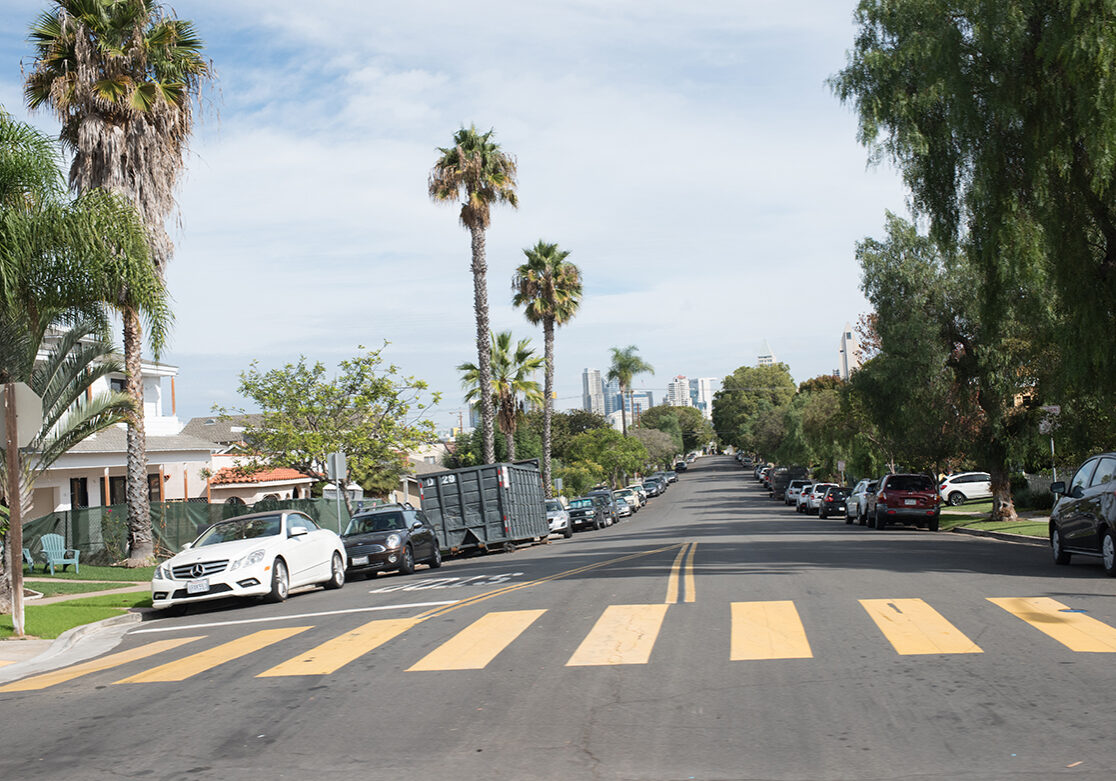
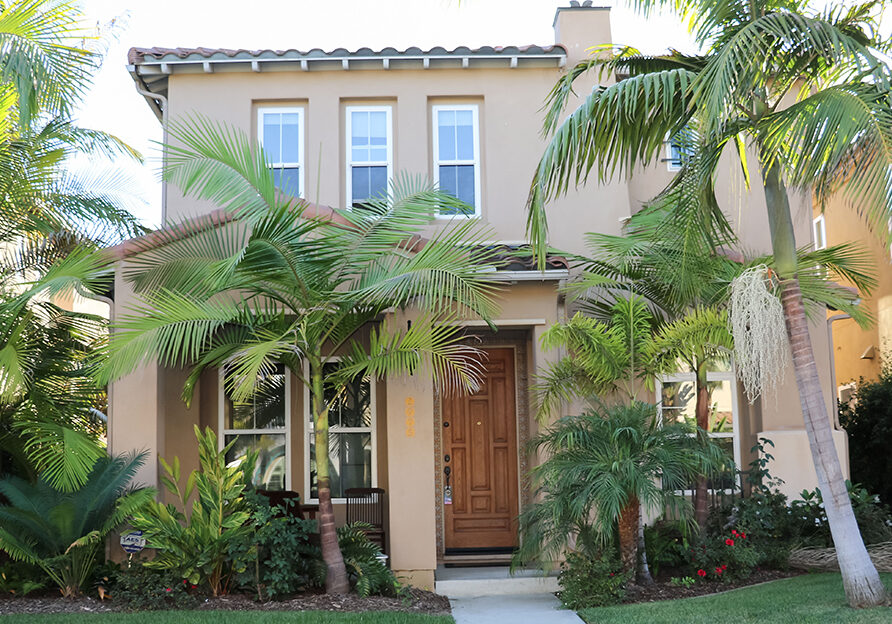
Area Info | Central
Points of Interest
- Coronado Island
- Coronado Ferry Landing
- Cabrillo National Monument and Lighthouse
- Tide pooling in Point Loma
- Torrey Pines State Natural Reserve
- Torrey Pines Golf Course and Lodge
- La Jolla Shores and Caves
- Historic Gaslamp District
- Balboa Park
- Seaport Village
- San Diego Zoo
- SeaWorld San Diego
- Mission Basilica San Diego de Alcala
- Birch Aquarium at Scripps
Big Plus
- Most of the area’s best attractions are downtown, and people visit from far and wide.
- This area is very convenient to most of the military bases in San Diego.
- Many of the neighborhoods are walkable and have every amenity you could need within their borders. Gourmet grocers, farmers’ markets, locally-owned boutiques and restaurants, and community events are all close at hand.
- You are very close to the beach and nightlife, making it a young servicemember’s dream.
Things to Consider
- If you feel claustrophobic in urban environments, you may want to rethink living in City Center. Personal “elbow room” and green space are scarce, but the parks and public spaces more than makeup for it! Like you would in any big city, you’ll be paying a premium for space here.
- Not having a car is an option, but the public transit isn’t quite to the level of some East Coast metropolitan areas. This is a very densely populated area, and the traffic can crawl. Parking is also hard to come by, so you’ll likely need to pay for a space.
- Families we spoke to stated that they focused their search on other areas (East County, North County Inland) because of Central San Diego’s small home sizes and the high cost of living.
La Jolla
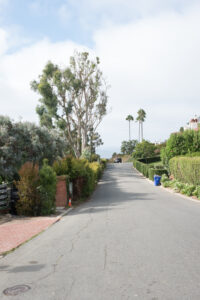 About
About
La Jolla is considered one of the most popular beach towns in America. Pronounced “la hoya,” this jewel of California boasts a dramatic coastline, a quaint village lifestyle, gentle surf, and stunning beaches. This picturesque oceanside town is surrounded by water on three sides and has some of the most expensive homes in the area. The vibe is upscale casual—we didn’t even know that was a thing! Museums, a play house, and the renowned Torrey Pines Golf Course and Lodge are veritable playgrounds for the rich and famous. Though pricey, it is a phenomenal place to consider for retirement!
Highlighted Areas
- La Jolla Heights
- La Jolla Shores
Homes
Homes in La Jolla are large, and mansions are typical. The average square footage is around 3,000. Your best bet for something “affordable” by military BAH standards would be to look for a guest house rental.
Schools
The public schools in La Jolla are part of the San Diego Unified School District. San Diego Unified School District is the second largest district in California. The student population is richly diverse, representing 15-plus ethnic groups and more than 60 languages and dialects. The district offers a transitional kindergarten program and is implementing a multi-year plan to transition all district schools to a single traditional academic calendar, replacing the current system that includes 39 year-round schools.
San Diego Unified School District offers students the option to attend specialized magnet schools. Some of the unique programs include STEAM (Science, Technology, Engineering, Arts, and Mathematics), STEM (Science, Technology, Engineering, and Mathematics), Music Conservatory, Communications and Multimedia, International Baccalaureate (IB), Language Immersion, Visual and Performing Arts, Athletics, and MicroSociety. La Jolla schools are a part of High School Cluster #1.
Point Loma
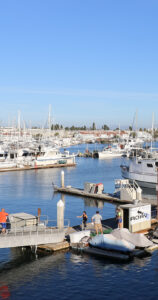 About
About
The Point Loma peninsula wraps around Coronado and guards the entrance to San Diego Bay. Rocky beaches meet the Pacific Ocean swells on the west, while the “Bay Side” provides a refuge for yachts, sport-fishing boats, and marine life. Military families love Point Loma for its history, trendy shopping, and family-friendly neighborhoods. A privatized base housing community is also located here, so you’ll be right at home amongst your military kin. Developers converted an old naval base into Liberty Station, a quirky “urban village” with hotels, shopping, restaurants, a movie theater, and a waterfront park. Tide pooling, whale watching, and sport fishing are popular pastimes in Point Loma (and are also colossal tourist draws, so consider yourself warned!).
Highlighted Areas
- Sea Colony
- Point Loma Heights
Homes
Like most coastal communities, anything over 2,000 square feet will run you into the millions. There are plenty of small beach cottages and two-story Spanish-style homes.
Schools
Public schools in Point Loma are part of the San Diego Unified School District. San Diego Unified School District is the second largest district in California. The student population is richly diverse, representing 15-plus ethnic groups and more than 60 languages and dialects. The district offers a transitional kindergarten program and is implementing a multi-year plan to transition all district schools to a single traditional academic calendar, replacing the current system that includes 39 year-round schools.
San Diego Unified School District offers students the option to attend specialized magnet schools. Point Loma schools are a part of High School Cluster #2.
Coronado
About
Coronado is a sought-after place to put down some temporary roots (or permanent ones if you’re lucky). Its name comes from the Spanish word for “the crowned one,” a term the area embodies with its sparkling beaches and gold-flecked sand. Coronado is referred to as an island but is connected to the mainland at Imperial Beach via a narrow causeway. A palpable “island life” vibe is evident in everything from the laid-back beach lifestyle to the eclectic, bungalow-style homes. The locals are hospitable, and “Nado” has a classic, small-town feel. Gentle surf and wide beaches create delightful playgrounds, and several fantastic parks amuse the little ones. The island is home to Naval Air Station North Island (NASNI) and the Naval Amphibious Base (NAB). Because of this, you will be surrounded by your military kin. Coronado is also a hot spot for retirees, and tourists are present year-round.
Highlighted Area
- Coronado Village
Homes
Most military families will find themselves in one of the smaller bungalows (around 1,000 square feet) or guest homes of larger estates. Space is such a hot commodity that we’ve heard of people repurposing garages and spare rooms into bedrooms. There are also plenty of million-dollar mansions if that suits your budget! Besides the historic mansions and the Hotel Del Coronado, many of the island's homes date back to the 1950s. Many homes are now being bulldozed to make room for new homes. You won’t find any high-rise apartment or condo buildings on the island due to height restrictions on buildings.
The housing market in Coronado is competitive, and the homes are pricey. The SEAL community occupies many of the island's houses, which tend to change hands primarily by “word-of-mouth.”
Schools
The public schools in Coronado are in Coronado Unified School District. There are many special programs in the Coronado Unified School District: Science, Technology, Arts, Engineering, and Math pathways (STEAM); Coronado School of the Arts (CoSA); and Navy Junior Reserve Officer Training Corps (NJROTC), to name a few. CUSD is a very military-friendly school district with an active School Liaison Office, and there are many programs for military students and their parents! Crown Preschool is operated by the Coronado Unified School District and is available, for a fee, to three- and four-year-old children.

North Park
About
North Park is centrally located in San Diego, and traveling to the beaches or downtown is easy. If you want to be close to downtown and enjoy the trendiest shops and restaurants, then North Park should be on your shortlist. It is a vibrant, young, and walkable community with art galleries, live theaters, farm-to-table restaurants, and craft breweries on every corner. Young singles flock to the area, and the married couples here typically live on two incomes. Balboa Park is a short bike ride away, and so are this urban refuge's numerous events and festivals. The Uptown neighborhoods of North Park and Hillcrest are ideal if you commute to Naval Base San Diego (32nd Street). It's also very convenient to hop on Interstate 805 ("the 805" north/south) or Interstate 8 ("the 8" east/west).
Highlighted Area
- Pacific Ridge
Homes
A lot of the housing inventory in North Park consists of smaller condos and apartments (800 to 1,800 square feet). As with most urban downtown areas, parking will be tricky, and you should figure out a parking space or garage pass with the rest of your housing expenses.
Schools
The public schools in North Park are in San Diego Unified School District. San Diego Unified School District is the second largest district in California. The student population is richly diverse, representing 15-plus ethnic groups and more than 60 languages and dialects. The district offers a transitional kindergarten program and is implementing a multi-year plan to transition all district schools to a single traditional academic calendar, replacing the current system that includes 39 year-round schools.
San Diego Unified School District offers students the option to attend specialized magnet schools. Some of the unique programs include STEAM (Science, Technology, Engineering, Arts, and Mathematics), STEM (Science, Technology, Engineering, and Mathematics), Music Conservatory, Communications and Multimedia, International Baccalaureate (IB), Language Immersion, Visual and Performing Arts, Athletics, and MicroSociety.
Hillcrest
About
Hillcrest is another Uptown San Diego gem close to Naval Base San Diego (32nd Street) that draws young singles by the droves. It’s renowned as San Diego’s vibrant LGBTQ central hub, with blocks and blocks of entertainment, shopping, restaurants, bars, and coffeehouses. Hillcrest is walkable, and you’ll find patio dining at every locally-owned cafe you pass. Farmers’ markets, Whole Foods, and Trader Joe’s are your grocers, and the shopping is eclectic and colorful. This lively neighborhood has parades, concerts, and festivals that keep the party going. Hillcrest is a little more urban, with fewer parks and green spaces than other neighborhoods.
Highlighted Areas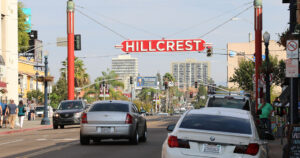
- Mission Hills
- Marston Hills
Homes
Hillcrest has a mix of apartments and bungalows near the business district. Townhomes are also popular. The average home size in North Park is 800 to 1,600 square feet.
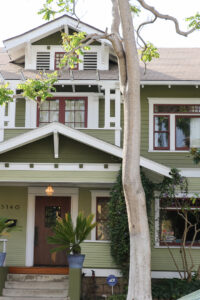 Schools
Schools
Public schools in Hillcrest are part of the San Diego Unified School District. San Diego Unified School District is the second largest district in California. The student population is richly diverse, representing 15-plus ethnic groups and more than 60 languages and dialects. The district offers a transitional kindergarten program and is implementing a multi-year plan to transition all district schools to a single traditional academic calendar, replacing the current system that includes 39 year-round schools.
San Diego Unified School District offers students the option to attend specialized magnet schools. Some of the unique programs include STEAM (Science, Technology, Engineering, Arts, and Mathematics), STEM (Science, Technology, Engineering, and Mathematics), Music Conservatory, Communications and Multimedia, International Baccalaureate (IB), Language Immersion, Visual and Performing Arts, Athletics, and MicroSociety. North Park schools are a part of High School Cluster #2.
Downtown
About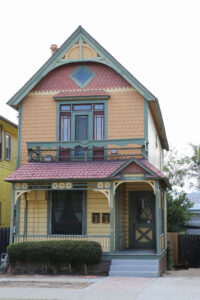
San Diego has a lively downtown with world-class dining, community events, trendy gastropubs, and tasting rooms showcasing the region’s many wineries. Also referred to as Center City, downtown is walkable, and the vintage trolley can get you to destinations within walking distance. The historic Gaslamp District is a cultural gem with theaters, galleries, symphony halls, concert venues, and museums. The nightlife here is sophisticated, with rooftop bars and posh nightclubs. Singles and couples without children typically flock downtown or to one of its many off-shoot neighborhoods to be the center of it all.
Highlighted Areas
- CityFront Terrace
- Pinnacle
Homes
Living downtown is like living in most other urban cities. You’re sacrificing space to be in the middle of all the action. Condos, lofts, apartments, and penthouses contained in modern high-rises are the norm. The sizes of the units range from around 800 to 1,800 square feet, and they are very pricey.
Schools
Public schools in downtown San Diego are part of the San Diego Unified School District. San Diego Unified School District is the second largest district in California. The student population is richly diverse, representing 15-plus ethnic groups and more than 60 languages and dialects. The district offers a transitional kindergarten program and is implementing a multi-year plan to transition all district schools to a single traditional academic calendar, replacing the current system that includes 39 year-round schools.
San Diego Unified School District offers students the option to attend specialized magnet schools. Some of the unique programs include STEAM (Science, Technology, Engineering, Arts, and Mathematics), STEM (Science, Technology, Engineering, and Mathematics), Music Conservatory, Communications and Multimedia, International Baccalaureate (IB), Language Immersion, Visual and Performing Arts, Athletics, and MicroSociety.
East County
About
East County offers a little bit of everything. Rolling hills, breathtaking mountains, dramatic canyons, and glistening lakes can all be found in this nature lover’s playground. The Anza-Borrego Desert State Park, Cleveland National Forest, and Mission Trails Regional Park call East County home. Enjoy the Vegas-style casinos and resorts tucked away in the desert, or take a trip to the historic mining town of Julian. East County is farther from the ocean and warmer than the coastal regions. Its distance from the beaches also means that East County has some of the area’s most affordable homes.
Neighborhood Feel
In East County, you’ll find families, plenty of military, a lot of working-class folks, and farmers. Part of the county sits on the border with Mexico, so there is a rich Hispanic influence—and some of the best Mexican food north of the border. Neighborhoods in East County run the gamut from pockets of well-established communities to run-down mobile home parks. The landscape is varied as well. Gentle hills, stunning lakes, and steep mountainsides make up the western reaches, while deserts and canyons are in the east.
Area Info | East County
Points of Interest
- Santee Boulders
- Santee Drive-In Movie
- Lake Murray (La Mesa)
- Mount Helix Park (La Mesa)
- El Capitan Reservoir and Preserve
- Several Native American Casinos and Resorts
Big Plus
- The hiking and outdoor recreation opportunities are limitless in East County. The terrain varies from desert to mountain, with lakes and reservoirs to play or fish in. Year-round sunshine facilitates impromptu camping trips and family adventures.
- You’ll find world-class golf courses and resorts nestled amongst the hills and expanses of land in East County. If you’re looking for more excitement, try your luck at one of the region’s casinos. The historic Gold Rush mountain town of Julian is a must-see, and you cannot leave without an apple pie. Thank us later!
- You can create a little “breathing space” in East County. Home prices shrink, and square footage increases as you move away from the coast.
Things to Consider
- East County is considered “inland, " meaning you’re looking at a longer commute. The western edges of East County are about 20 minutes from downtown San Diego.
- The weather is considerably warmer here than on the coast (almost 20 degrees hotter). The towns in the valleys or the desert rarely feel the cool ocean breezes, making central air conditioning a must. Not all homes come equipped for cooling, so be sure to consider that when evaluating potential houses. Also, be prepared for the high utility costs associated with home cooling. Homes typically cost less in this region than on the coast, which can offset the electric charges.
- You may happen upon more wildlife in this part of the county, especially while hiking. Be aware of rattlesnakes, mountain lions, and more when you’re out and about in nature.
Santee
 About
About
Santee is a recently developed suburb just east of the city. It’s a family-oriented town with various shopping, dining, entertainment, and recreation options. Brand-name shopping abounds, and access to the significant freeways makes getting too many San Diego area attractions easy. Santee boasts fantastic parks (including dog and skate parks) and recreation areas. Although Santee is in East County, it is only 18 miles from the coast! If you time the traffic right, you can find yourself in La Jolla in under 20 minutes. You’re also close to downtown San Diego and many military bases. Although Santee has a reputation for cultural homogeneity, the city is seeing a surge in the diversity of its residents.
Highlighted Areas
- Riverwalk
- California Mariposa
Homes
The homes in Santee are typically around 1,200 to 1,800 square feet, but you can also find larger single-family homes with yards.
Schools
The public schools in Santee are part of Grossmont Union High School District or Santee School District. Santee School District offers a free Early Admission to Kindergarten (EAK) program to families who meet income requirements and other eligibility requirements. A fee-based transitional kindergarten is also available for those who do not meet the criteria for EAK.
The Grossmont Union High School District consists of nine comprehensive high schools, two charter schools, one continuation high school, two alternative education sites, four special education facilities, a middle college high school program, a Regional Occupational Program (ROP), and an adult education program.
Check out the publicly funded charter school options: Literacy First Charter School and River Valley Charter School.
El Cajon
About
El Cajon (pronounced “el ka-hohn”) is an inland city in East County with an array of affordable housing near San Diego. The name is Spanish for “the box” and was given to the city due to its “boxed in” position in the valley. It is predominantly a working-class city and is rich in diversity and culture. The shopping and restaurant options are plentiful with a mall, HomeGoods, Target, Dick’s Sporting Goods, etc. We can’t help but wonder if the “box” moniker predetermined its retail scene. The homes are affordable, and you’ll find the weather a little warmer—add ten degrees to the coastal temperatures. You’ll want to be on the lookout for homes with central air conditioning and brace yourself for the added utility costs.
Highlighted Areas
- Horizon Ridge
- Granite Hills
Homes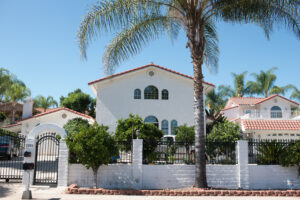
El Cajon has an abundance of one-story, older ranch homes that range from 1,200 to 2,000 square feet. There are pockets of great neighborhoods mixed amongst some areas with run-down houses. We recommend doing additional research before choosing a home in the area.
Schools
Public schools in El Cajon belong to Grossmont Union High School District or Cajon Valley Union School District. The Grossmont Union High School District consists of nine comprehensive high schools, two charter schools, one continuation high school, two alternative education sites, four special education facilities, a middle college high school program, a Regional Occupational Program (ROP), and an adult education program.
Check out the publicly funded charter school options: Literacy First Charter School, EJE Academies Charter School, and Diego Valley Charter School.
The Cajon Valley School District offers a free Early Admission to Kindergarten (EAK) program to families who meet income requirements and other eligibility requirements. A fee-based transitional kindergarten is also available for those who do not meet the criteria for EAK.
Lakeside
About
Lakeside is one of the county's best “bang for your buck” areas. Originally named for the small natural lake it surrounded, Lakeside is now home to three large reservoirs. This desert area is popular with military families because of the opportunity to have a larger home with more land. Because it is farther inland, you’ll see much higher temperatures here. Locals consider it “cowboy country,” mainly because of its rural setting and horse-loving residents.
Highlighted Areas
- Old Town Lakeside
- Lake Jennings
- El Capitan Reservoir
Homes
Lakeside homes are much larger than you’ll find closer to San Diego and range in size from 1,200 to 2,800 square feet.
Schools
The public schools in Lakeside are in Grossmont Union High School District or Lakeside Union School District. The Grossmont Union High School District consists of nine comprehensive high schools, two charter schools, one continuation high school, two alternative education sites, four special education facilities, a middle college high school program, a Regional Occupational Program (ROP), and an adult education program.
Lakeside Union School District offers foreign language immersion programs in select schools throughout the district. The regular school curriculum is taught in the immersion language for at least half of the school day. In partial immersion programs, instructional time is divided equally between English and the immersion language throughout the elementary grades. In total immersion programs, teachers use no English in the early grades.
Early Admission to Kindergarten (EAK) is a free, state-funded preschool offered in Lakeside Union School District. This program is available to families who meet income requirements and other eligibility requirements.
Check out the publicly funded charter school options: Literacy First Charter School and River Valley Charter School.
La Mesa
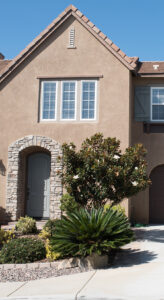 About
About
La Mesa has the feel of an urban San Diego village with less inflated price tags, more space, and less commotion. A quaint downtown draws residents to visit mom-and-pop restaurants, independently-owned shops, and antique stores. It is referred to as “The Jewel of the Hills” because of its perch on a plateau above the surrounding valleys. Lake Murray and La Mesa’s numerous parks and trails offer ample opportunity to explore the outdoors.
Highlighted Areas
- Mount Helix
- Winsor Hills
Homes
Homes in La Mesa are larger than those found closer to the coast or in San Diego. Typical square footage ranges from 1,500 to 2,800 square feet. There are pockets of great neighborhoods mixed amongst some areas with run-down homes. We recommend doing additional research before choosing a home in the area.
Schools
The public schools in La Mesa belong to Cajon Valley Union School District or La Mesa-Spring Valley Schools.
Early Admission to Kindergarten (EAK) is a free, state-funded preschool offered in both districts. This program is available to families who meet income requirements and other eligibility requirements. For those who do not meet the state-funded program requirements, La Mesa-Spring Valley Schools offers a fee-based preschool program called SmartSteps. Transportation is not provided.
North County Coastal
About
San Diego’s North County is vast and typically broken into coastal and inland regions. The coastal area consists of uniquely Southern California beach towns and seaside villages between the coastline and Interstate 5 (“the 5”). Somewhere between I-5 and Interstate 15 (“the 15”), the culture and the geography start to change, marking a shift from coastal to inland. The beach towns have retained a small-town feel and pride themselves on picturesque beaches, locavore culture, casual lifestyle, world-renowned surfing, and a reverence for nature. Quirky little villages like Carlsbad and Solana Beach are vibrant communities with stunning views, cool coastal breezes, and resort-caliber amenities. Vista and Oceanside sprawl far enough inland to provide more affordable housing. Encinitas and Del Mar are natural havens with many outdoor activities, including trails for biking or hiking, equestrian sports, golfing, sport fishing, and—of course—surfing.
The climate is mild year-round and can be pretty cool compared to the inland regions. During the early summer months, the marine layer fog keeps the mornings cool but burns off in the afternoon. Access from the coastal towns to I-5 is convenient, so getting to downtown San Diego, Orange County, or Los Angeles is easy. Camp Pendleton lies between North County and Orange County, so if you want to “split the difference” in commutes, this is a great area to consider.
Neighborhood Feel
As with most of San Diego, you can find all types of people in North County. The coast attracts beach bums, surfers, retirees, and families who look to the miles of warm sand as a refuge or playground. The northern communities of Oceanside, Vista, and Carlsbad all have a heavy Marine presence due to the proximity to Camp Pendleton. Some of the more expensive cities, like Del Mar, Solana Beach, and Encinitas, are home to wealthy locals, retirees, and a few high-ranking military families. Mainly, the people here are laid back, working class, active, and outdoorsy. You won’t see many three-piece suits, but flip-flops, shorts, and military uniforms are commonplace.
Homes in North County Coastal tend to be smaller, especially as you approach the water and move to the west of I-5. Ocean breezes provide nature’s A/C, and most homes will not have central air conditioning. The single-family homes are primarily built in the Spanish stucco style with red-tiled roofs. Yards are small, and patios are considered extra living spaces. Condos, townhomes, and apartments are an option for many and offer a more affordable option for those dead set on living near the beach.
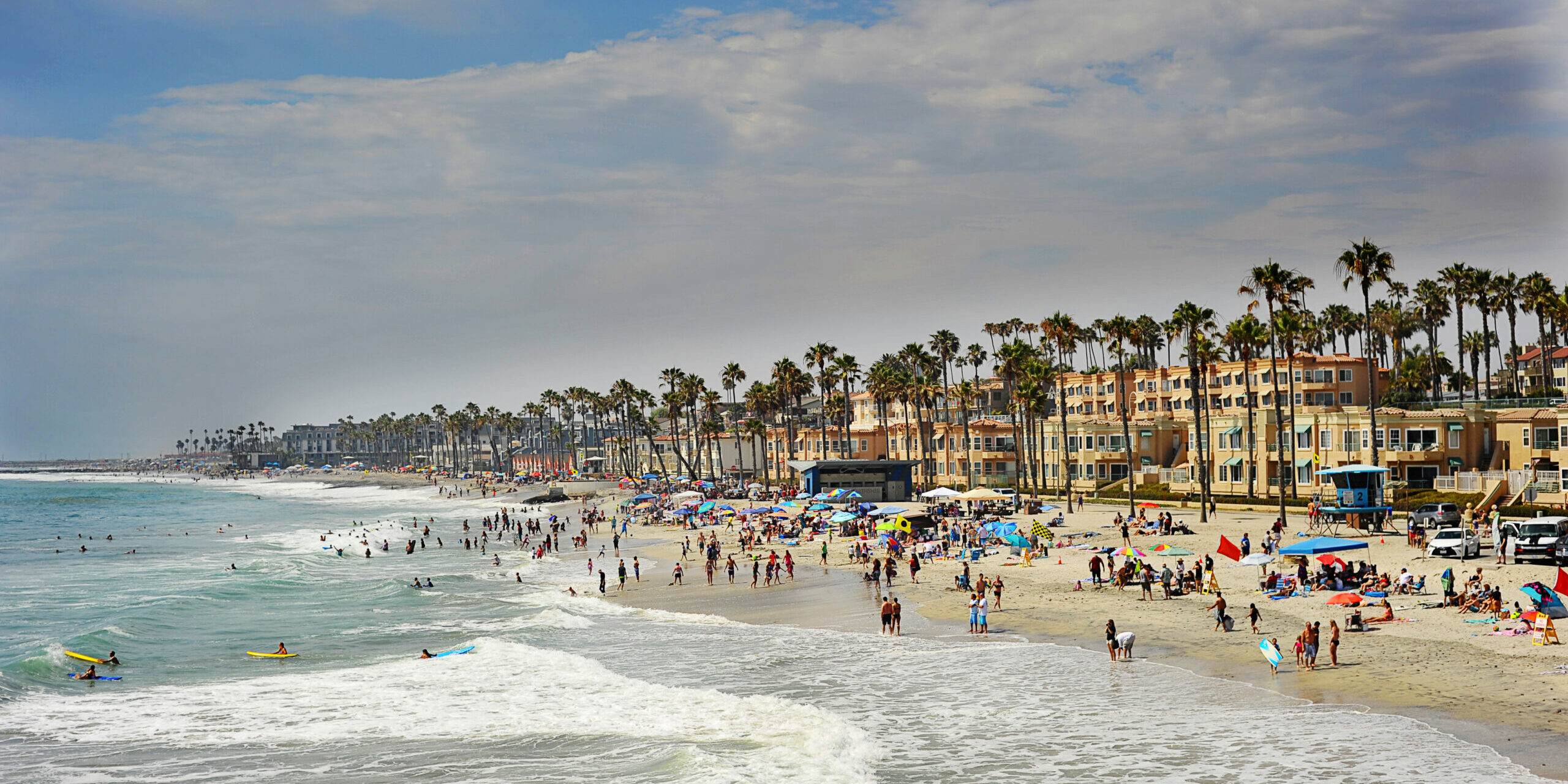
Area Info | North County Coastal
Points of Interest
- San Diego Botanical Garden (Encinitas)
- Del Mar Race Track
- Del Mar Farmers’ Market/Open Air Market
- Oceanside Pier
- Oceanside Coaster Tramway
- LEGOLAND
- Sea Life Aquarium
- The Moonlight Amphitheatre (Vista)
- The Wave Waterpark (Vista)
- Torrey Pines State Reserve
- Torrey Pines Golf Course
Big Plus
- The beaches. Any of the beaches. Go for the day, for a surf sesh before work, for a bonfire with friends, or a sunset viewing before bed. Living in North County Coastal means that, for the most part, you’ll be no more than 20 minutes from the beach at all times, which is what living in San Diego is all about.
- Living near the coast can help you save money on utilities. The coastal regions remain about 10 to 20 degrees cooler than their neighbors to the east. You’ll be able to take advantage of nature’s cooling system by opening the windows, negating the need for a pricey central A/C unit.
- The opportunities for outdoor activities are limitless. Hiking, horseback riding, stand-up paddle boarding, surfing, camping, fishing, whale watching, and biking are all popular pastimes in North County.
- You’ll have easy access to the COASTER train from any North County Coastal area. The train follows the coastline from San Diego to Oceanside.
- This is a great “split-the-difference” area if you want to be halfway between San Diego and Camp Pendleton.
Things to Consider
- The fact that it has “Coastal” in the name should be a massive clue as to home values and the overall cost of living. You will spend much more to live here and may need to adjust your idea of how much space you need. You’ll find a lot of single service members, dual-income couples, and families in these areas who are willing to sacrifice space and pay above BAH to be near the beach.
- The beach towns are a huge draw and can get quite busy during peak tourist seasons. The abundance of craft breweries, bars, and nightclubs in some cities can add to the festive atmosphere.
- Traffic along the I-5 can be daunting and slow to a crawl during rush hour.
Oceanside
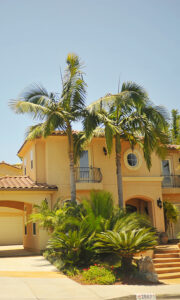 About
About
Oceanside has a little bit of everything. As an immediate neighbor to Camp Pendleton, the city is home to many Marines and their families. You'll find a mix of new and longtime residents in most neighborhoods. Young families and singles love Oceanside for the affordable housing options—for a Southern California beach town. Oceanside's downtown is on the beach, bustling with activity and festive nightlife. Arrowood, Rancho del Oro, coastal condos to the west of I-5, and areas farther inland (close to Vista and Bonsall) are recommended by military spouses.
Highlighted Areas
- Arrowood
- Guajome
- Summerview
Homes
The neighborhoods can be a little hit or miss throughout Oceanside. There are some fantastic homes on the ocean side (west) of I-5, but most traditional suburban neighborhoods are farther inland (closer to Bonsall). Expensive coastal condos are available near the water, but you can also find apartments with several young Marines or locals splitting the rent to have more cash for the "party fund." You'll want to do your due diligence if you're looking at a property close to the eastern side of I-5.
Schools
Most of Oceanside is zoned to the Oceanside Unified School District or the Vista Unified School District. Spouses in the area highly recommended the Coastal Academy Charter School,
which operates a blended in-seat and independent study program. That means your student will usually attend class once per week, and you'll supplement the instruction the rest of the week at home.
Bonsall Unified School District and Oceanside Unified School District are a part of a consortium of four other school districts created by the University of Southern California for an initiative called Welcoming Practices. The program recognizes the unique needs of military children in school transitions. It aims to ensure "that district and school staff members have access to the tools they need to create welcoming and effective transition procedures that give students a successful start at their new school." We think this deserves massive kudos!
Carlsbad
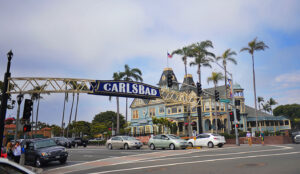 About
About
This quirky seaside village has been a tourist destination since the 1880s. There are over 50 miles of hiking trails in Carlsbad with incredible views and overlooks, several world-class golf courses, a restaurant scene even the most discerning foodie will love, and of course—LEGOLAND. The cost of living and housing in Carlsbad is a bit more “doable” for military families than some of the uber-swanky beach towns farther south; however, you will still be maxing out your BAH. Dual-income families will have a bit of wiggle room in their budget. Downtown San Diego is just a short 30-minute drive down the scenic Pacific Coast Highway from Carlsbad. Carlsbad is ideal for those stationed at Camp Pendleton but also an option for many San Diego installations. You can still find a cozy, family-friendly atmosphere in Carlsbad, even though it’s a beach town. Sometimes the beach towns get a little festive, but Carlsbad has a more sophisticated nightlife and a much slower pace.
Highlighted Areas
- Villages of La Costa
- Chestnut Hills
- Bressi Ranch
Homes
Homes in Carlsbad range from 1,300 to 2,500 square feet but seem mostly under 2,000. There are larger homes available, but you’ll be paying millions for a larger house or coastal mansion.
Schools
The public schools in Carlsbad belong to San Marcos Unified School District or Carlsbad Unified School District. Carlsbad does not have a charter school, but many spouses said there are so many quality traditional public schools in the town that there hasn’t been a need for one. Carlsbad boasts of an all-male, tuition-based boarding school, The Army and Navy Academy, for grades 7 through 12 as one of its private school options.
Vista
About
Though still considered coastal, Vista lies just far enough inland to enjoy a hybrid of some of the best weather in Southern California. The beach is only five miles away, but that distance allows the marine layer fog to burn off while the coastal breezes still blow through. The affordable housing in Vista and its proximity to the beach draw a lot of young singles and geo-bachelors looking to save on BAH.
Highlighted Areas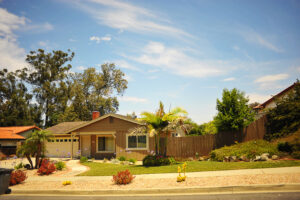
- Riviera Estates
- Alta Vista
Homes
The average home size in Vista is between 1,800 and 2,500 square feet, making medium-sized homes attainable. The larger homes are located closer to Carlsbad and areas farther inland, whereas the houses close to the ocean will be on the smaller end of the spectrum.
Schools
Public schools in Vista belong to Vista Unified School District or San Marcos Unified School District. Vista has a highly recommended Montessori charter school, the Bella Mente Montessori Academy, and other well-rated charters. Thanks to the choice system, you can also take advantage of charter schools in the surrounding areas if the traditional public schools in Vista aren’t to your liking.
Encinitas
About
Encinitas is an idyllic seaside city in North County that attracts people from all walks of life, from families to scientists and surfers. The downtown is thriving and filled with eclectic shops and restaurants. Museums, art galleries, and historic homes help preserve the quirky personality of the city, and a booming tech industry is reinvigorating the population. The schools in Encinitas are top-notch, and the communities are richly diverse. Encinitas boasts nearly 30 miles of trails that cyclists, equestrians, and hikers enjoy, and the almost 1,000-acre San Elijo Lagoon Ecological Reserve is a delight to explore. Surfers of all abilities flock to the Swami’s, a world-renowned reef and point break producing epic swells during the winter. San Diego lies roughly 25 miles to the south.
Highlighted Areas
- Pacific Serena
- Quail Park
- Saxony
Homes
Homes in Encinitas are pricey, and you are paying for location. The average home size is between 1,000 to 2,200 square feet, but affordable homes for most military families will be on the smaller side. Anything over 2,000 square feet will put you into the million-dollar-plus price range.
Encinitas has five communities, each with its personality and home style. Old Encinitas is a historic district that lies on the beach and includes a variety of home styles. New Encinitas is where you’ll find the larger tract homes, shopping, and a golf course. Olivenhain is a more rural area with a sizeable equestrian presence and predominantly single-family homes. Cardiff-by-the-Sea and Leucadia are swanky oceanfront communities.
Schools
Public schools in Encinitas are part of San Dieguito Union High School District or Encinitas Union School District. The open enrollment period for interdistrict transfer requests is January 4 through 31. Applications for an interdistrict transfer are available at your school district of residence, which must first release you to transfer. Only a limited number of new transfers are accepted by Encinitas Union School District each year, and interdistrict students are placed only after all intradistrict requests have been granted. You can apply to more than one school at a time, all on one form. Acceptance is based on available space, and those who apply after enrollment are placed on a waitlist.
All nine Encinitas Union School District schools have received local, state, and national award recognition for their innovative programs and outstanding student achievement. Four Encinitas Union School District schools—La Costa Heights, Mission Estancia, Olivenhain Pioneer, and Park Dale Lane—have received National Blue Ribbon status for their educational achievements and programs.
Julian Charter School is a tuition-free public charter school serving students grades K through 12 in Encinitas and comes highly recommended by military spouses.
Solana Beach
About
This gorgeous seaside town has grown into an uber-wealthy enclave over the past few decades. You may still find vestiges of its more modest past in the beach “shacks,” but for the most part, the modern mansions stacked on the hillsides are large, imposing, and extremely pricey. Solana Beach is an affluent bedroom beach community with the essentials, but you may find yourself traveling to Encinitas for big shopping trips (Target, Trader Joe’s, etc.). There is a strong “surfer vibe” here that augments the upscale artistic flare of the galleries and designer boutiques of the Cedros Design District. This area is exceptionally family-friendly, with well-regarded schools and many parks and playgrounds.
Highlighted Areas
- St Francis Court
- San Elijo Hills
Homes
The mansions on the coast (west of Old Highway 101) are huge and have multi-million-dollar price tags. Moderately sized homes on the beach (between 1,800 to 3,000 square feet) are still in the million-dollar-plus range. Price tags and home sizes stay pretty consistent, even as you travel inland, because of the proximity to Lomas Santa Fe Golf and Country Club.
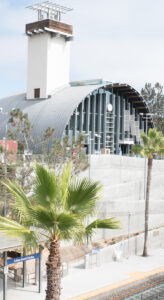 Schools
Schools
The public schools in Solana Beach belong to Solana Beach School District. The Solana Beach School District has designated attendance areas for each school. However, an open enrollment policy is maintained to provide enrollment options that meet district students' and their parents' diverse needs and interests.
Julian Charter School is a tuition-free public charter school serving students grades K through 12 in Solana Beach. Julian Charter School has many programs, including Home Study and Academy options.
Del Mar
About
Del Mar is a beautiful, hilly oceanfront village with a lot to offer for families and singles alike. The beaches are pristine, the parks are immaculate, and the playgrounds and schools are some of the best in the county. This seemingly ideal community comes with quite the price tag, though, and you aren’t likely to see a lot of military in the area. Local shopping is available for everyday needs, but most shopping is done nearby Encinitas. The Del Mar Racetrack is a destination known to most San Diegans for family fun, and the San Diego County Fair is hosted annually in Del Mar.
Highlighted Areas
- Olde Del Mar
- Del Mar Colony
Homes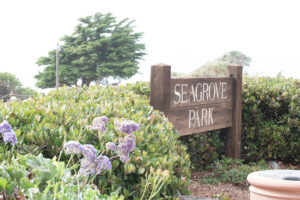
Many newer homes in Del Mar are mixed in with a diverse array of home sizes and architectural styles. Homes range from smaller bungalows (1,300 square feet) to sprawling hillside mansions (4,000 to even 7,000 square feet). Be prepared for sticker shock, though, as even the beach shacks have million-dollar price tags.
Schools
San Dieguito Union High School District serves students from five elementary school districts in North County: Encinitas, Rancho Santa Fe, Cardiff, Solana Beach, and Del Mar. Del Mar contains four primary and secondary schools. The public schools in Del Mar are part of San Dieguito Union High School District or Del Mar Union School District. This district's extracurricular activities and curriculum paths are varied and so very SoCal. Where else would you see Surf P.E. in a course catalog?
Interdistrict and intradistrict transfers are permitted if space allows and both districts’ governing bodies approve the transfer. There is a priority order when assessing transfers with the highest priority to students with parents teaching in the district.
In Del Mar Union School District, STEAM+ (Science, Technology, Engineering, Art, and Math) provides robust and engaging opportunities in an interdisciplinary setting.
Julian Charter School is a tuition-free public charter school serving students grades K through 12 in Del Mar. Julian Charter School has many programs, including Home Study and Academy options.
North County Inland
About
North County Inland is a vast region that lies just beyond the coastal mountains and extends out into the desert. Whereas the coastal communities in San Diego’s North County are densely populated, traveling inland affords you vast open space and diverse terrain. The sun shines a bit brighter here, as it is far enough away from the coast that the marine layer fog doesn’t darken the sky. You’ll find neighborhoods sprinkled amongst hills covered with groves of avocados, citrus, and grapes. Plan on spending a lot of time outdoors. Hiking, biking, and camping top the list of popular excursions. If you prefer to imbibe, you’ll be in heaven with dozens of craft breweries, and in the lush valleys beyond each set of rolling hills, you’ll find vineyards and wineries to suit even the most discerning oenophile. Of course, you’ll have to navigate the over 40 golf courses in the area. The ever-popular San Diego Zoo Safari Park is also located in Escondido and is a must-do. Military families flock to this region for the suburbs with affordable housing, more space, and a chance at a yard. Neighboring MCAS Miramar supplies a healthy stream of military residents, and many Navy families also opt to commute to the inland communities. This region is halfway between downtown San Diego and Anaheim and is just a quick drive on the freeway to the beaches.
Neighborhood Feel
North County Inland is an affordable, suburban locale inhabited predominantly by young professionals, working-class families, and military families. The vibe is still solidly Californian in its mellow, laid-back culture but a little less focused on leisure and the beach. Residents here tend to be either working or busy taxiing children around during the week.
The temperatures are 10 to 20 degrees warmer inland than on the coast, increasing the likelihood of finding homes with central A/C and a pool. Most homes tend to be larger than on the beach, but you will still be hard-pressed to find anything with more than three bedrooms. Neighborhoods are hilly with lush landscaping.
Area Info | North County Inland
Points of Interest
- Mount Woodson Trail and Potato Chip Rock
- Iron Mountain
- San Diego Zoo Safari Park
- Wineries – Orfila Vineyards & Winery, Cordiano Winery, Hungry Hawk Vineyards & Winery
- Discovery Lake
- Golf courses – St. Marks Golf Club, Twin Oaks Golf Club, Lake San Marcos Executive Club
- Palomar Mountain and Palomar Observatory
- Leo Carrillo Ranch Historic Park
- Many local breweries – sample some craft beer!
Big Plus
- North County Inland is a quick 30- to 40-minute drive to most of the San Diego area installations and only 20 minutes to the beaches.
- Homes are larger and more affordable.
- There’s no shortage of things to do, places to go, and adventures in this expansive and scenic region of the county.
Things to Consider
- Be sure to identify whether or not your potential home has air conditioning. If it does (and you’ll need it in the hot inland regions), utility bills can routinely exceed $300. One upside to living in warmer inland areas is that there are a lot of homes with pools!
- The good news is that you’ll have sunshine practically year-round, whereas the coast has a few months of foggy mornings. North County Inland can get up to 20 degrees warmer than the coast. Expect temps of 100 degrees or more in the summer.
- Like any suburban area, you’ll find areas of traffic and congestion, which can compound your commute.
- Because of the wide open spaces and diverse terrain, you’ll often find wildlife on trails and in more rural areas.
San Marcos
about
San Marcos is a vibrant city centrally located in the foothills of northern San Diego County and borders Carlsbad, Vista, and Escondido. This well-rounded area offers a little bit of everything.
Being centrally located makes commuting to San Diego reasonable, and the five and the 15 (San Diegans don’t say “interstate”) are easily accessible via Highway 78. The SPRINTER train connects San Marcos to Oceanside, and from there, you can also pick up the COASTER to go south into San Diego. Commuting from San Marcos is also feasible for those stationed at Camp Pendleton and MCAS Miramar. San Marcos is home to many restaurants and name-brand stores, thus alleviating the need to travel.
Outdoor recreation opportunities abound. The hills in San Marcos are perfect for hiking or horseback riding. The San Marcos Reservoir (Lake) is a fun destination for fishing and watersports, and the city has recently built over 63 miles of trails. There are also 35 parks and 11 recreation centers to amuse little ones and retirees. The economy is strong, and employment opportunities are available for career-minded spouses. Escondido is considered North County’s “Education Hub.” Palomar College and California State University San Marcos are located here, and the college students keep the area lively.
Highlighted Areas
- Discovery Hills
- Lake San Marcos
- Santa Fe Hills
Homes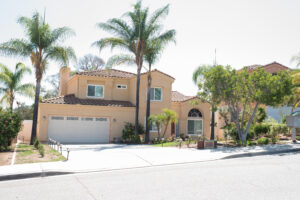
San Marcos has a diverse housing stock, and homes here tend to be larger than in some coastal regions, averaging around 1,300 to 2,800 square feet. You can easily find single-family homes that are 2,000 square feet or more, which is excellent for families. The homes vary in age, and you’ll often find a mixture of older (built in the 1950s) and newer homes. There are also plenty of brand-new, master-planned communities if that’s more your speed.
Schools
The public schools in San Marcos are part of the San Marcos Unified School District (SMUSD). San Marcos Unified School District offers a transitional kindergarten program for children ages 3 to 4. Intra/interdistrict transfers are available and processed case-by-case, with priority reserved for employees in the desired district.
There are many charter school options in San Marcos. A few that military spouses recommend include Pivot Charter School, Taylion, and Bayshore Preparatory Charter School.
Escondido
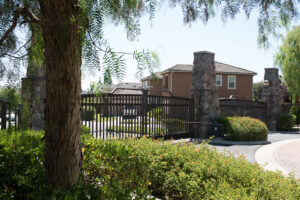 About
About
Escondido, Spanish for “hidden valley,” is nestled in the center of North County and is surrounded by hills covered with avocado and citrus groves. Though most military families will consider this locale too far away for commuting (around 45 minutes during rush hour to Camp Pendleton or MCAS Miramar), you can save upwards of $300 per month on housing expenses. Escondido is one of the few areas where you can find larger homes at or below BAH—especially if you’re earning Camp Pendleton BAH, which is higher than BAH for San Diego bases.
In Escondido, small-town hospitality and community meet big-city amenities. Escondido is very family friendly with suburbs, two lakes, a sports center, parks, and the nearby San Diego Zoo Safari Park. For more adult excursions, Escondido is home to art galleries, museums, golf courses, and wineries on the walkable Grand Avenue. All the shopping and dining you could want you’ll find in town, so there’s no need to venture far for errands. Your neighbors will primarily be working, middle-class families who still embody the casual Cali attitude.
Highlighted Areas
- Summer Creek
- Old Escondido
Homes
The historic district of Old Escondido dates back to 1888 and has an eclectic array of historic homes. In suburban areas, it’s common to see two-story stucco homes with modest yards. The housing options run the gamut from gated golf course communities with expansive mansions to well-maintained mobile home parks (sometimes near each other). There are pockets of neglect and some older, run-down areas, so we encourage you to research.
Schools
The public schools in Escondido are part of Escondido Union School District (EUSD) or Escondido Union High School District (EUHSD). Quantum Academy is an innovative school of choice for students in grades 4 through 8. Enrollment is open to all Escondido children through a lottery process. Bernardo Elementary School, L. R. Green Elementary School, and Reidy Creek Elementary are recommended by military spouses.
EUSD offers a School Choice program, meaning you can enroll your child at any school within the district. If you are enrolling in a school outside your district, transportation is not provided. Enrollment is limited by available space at each school. EUSD offers a transitional kindergarten program, three high schools, and two magnet high schools.
Poway
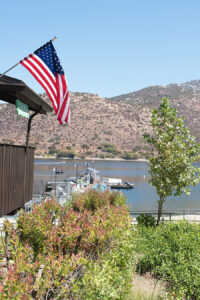 About
About
Poway (pronounced “pow-way”) is slightly inland and boasts a quasi-rural setting with accessible city amenities. Its rural roots gave rise to the perfect city slogan, “The City in the Country,” and preservation efforts have made changing that unlikely. Over half of the city’s incorporated acreage is protected open space, a welcome change from other densely populated areas in the county. The weather here is a bit warmer than on the coast, and a few days in the summer can see temperatures of 100 degrees or more.
If you have kids, you will most likely hear Poway recommended by other military families. It is popular because of the well-regarded schools, relatively affordable housing, and friendly residents. Shopping, dining, and entertainment options are plentiful, and there are many tight-knit communities to choose from. The beaches aren’t far, and the commute to San Diego is about 30 minutes.
Highlighted Areas
- Carriage Hills
- Normal Heights
- Rancho Arbolitos
Homes
Poway’s average home size is 1,100 to 2,000 square feet for most single-family homes. There are also homes over 3,000 square feet, but you’re looking at million-dollar-plus properties.
Schools
The public schools in Poway are part of the Poway Unified School District. Poway Unified School District offers transitional kindergarten. Inter/intradistrict transfers are authorized, and decisions are made by the Student Attendance and Discipline Office. Students requesting a transfer must be enrolled in their school of residence before attempting to transfer, and if approved, must provide their transportation. Priority is given in order of application receipt.
Another choice for K through 8th grade is Innovations Academy, a free public charter school that offers a traditional school day or homeschooling hybrid options with a unique curriculum. Make sure you apply during the open period. They hold a lottery for selection if they receive more applications than seats.
South Bay
About
South Bay is the southernmost region in San Diego County and lies just north of the U.S./Mexico border. It is the gateway to Baja California and home to some of the most authentic Mexican restaurants north of the border. Silver Strand State Beach is a picturesque escape for surfing, swimming, camping, or fishing. The U.S. Olympic Training Center is a fun excursion, and the Aquatica SeaWorld Water Park is a family favorite.
Neighborhood Feel
The proximity to several of the region’s military installations keeps South Bay on the shortlist for many military families. Though it’s still a Southern California locale, many of South Bay’s communities are home to diverse, working-class families. The neighborhood vibe for South Bay varies from town to town. Some cities have seen better days while others are pristine, with new master-planned communities.
Area Info | South Bay
Points of Interest
- Niederfrank’s Ice Cream
- Imperial Beach Pier
- Bayshore Bikeway
- ARCO Olympic Training Center
- Living Coast Discovery Center
- Aquatica SeaWorld Waterpark
- Las Americas Outlet shopping
- Sleep Train Amphitheatre
Big Plus
- Some of the area’s most notable suburbs are located in South Bay (particularly Eastlake and Otay Ranch). Affordable homes can be found here, and excellent investment opportunities in up-and-coming areas (Imperial Beach).
- The Silver Strand State Beach is a local gem, and South Bay has a laudable commitment to the environment and eco-tourism.
- Some of the region’s most affordable golf courses are in South Bay.
- Chula Vista is home to some of the best Mexican food on this side of the border!
Things to Consider
- A trip across the border can be a fun adventure, but you should familiarize yourself with the area and take safety precautions. Check with your chain of command to see if there are “off-limits” areas before trekking south.
- South Bay is a great area to consider if you’re commuting to the coastal Navy installations, but if you need to get much farther north, you’ll face a more challenging commute.
- Homes close to the water benefit from nature’s cooling through coastal breezes. However, if you’re farther inland, you should research home cooling options. The farther inland you go, the warmer it gets (by increments of 10 to 20 degrees). Utility costs in California are no joke, and paying for central air conditioning can be very pricey.
National City
About
National City is located “right outside the gate” of Naval Base San Diego, giving it a checkmark in the “pro” column for commuting to 32nd Street. It’s one of the oldest areas in San Diego, and some of its neighborhoods can appear a little run-down. If you look beyond the strip malls and pawn shops that typically anchor near the gate, you can find a few blocks of single-family homes near the city's western side, as well as large historic homes in the canyons to the east. National City is a working-class, industrial area with affordable housing options. Military residents are typically single seamen looking to save on housing and be close to the base. National City has proud Filipino and Mexican communities and some of the best international eateries and stores.
Highlighted Areas
- Coronado Village
- Kalesa Walk
Homes
Homes in National City tend to be small, ranging from 1,000 to 2,000 square feet. Apartments are plentiful, but there are a few small single-family homes available. We recommend you research neighborhoods in this area before buying or renting a home.
Schools
Public schools in National City belong to Sweetwater Union High School District (SUHSD) or National School District. National School District offers numerous free programs throughout the district, including breakfast and lunch for all students, before- and after-school programs, music and band, electronic learning boards in every school, and preschool, to name a few. Intradistrict and interdistrict transfers are honored when space is available, and the programs won’t be compromised. Transportation is not provided for transfer students.
California’s richness in cultural, linguistic, and economic diversity is reflected in SUHSD’s student population, which includes Hispanic, Filipino, African-American, Asian, and other ethnicities. Approximately half of Sweetwater’s students speak a language other than English at home.
SUHSD offers unique programs for its students, like free before- and after-school care for middle schoolers. School days operate on block scheduling, and some schools offer International Baccalaureate (IB) curriculum. MAAC Community Charter School ensures a vocational job for those who graduate from their program.
West Chula Vista
About
Chula Vista is just south of San Diego in the South Bay region of San Diego County. It is roughly translated from the Spanish for "beautiful view," which aptly describes the area's diverse terrain. Chula Vista ranges from San Diego Bay to the foothills of the coastal mountains. The city is divided by Interstate 805 into two distinct areas: West Chula Vista and East Chula Vista. West of the 805, you'll find the older town section with small homes dating back to the 1950s. There are no HOAs or organized subdivisions, so the upkeep of properties is less uniform. The west side is more urban, and you are likelier to see bars on windows. West Chula Vista is very close to the southern naval bases and downtown San Diego, but getting to the other side of North County can take an hour or more.
Highlighted Areas
- Otay Ranch
- Rancho Del Rey
- Eastlake
Homes
Homes in the older section of Chula Vista (west of the 805) are primarily small ranch-style ranging from 1,100 to 1,600 square feet. Occasionally, you can find a home with 2,000 square feet.
Schools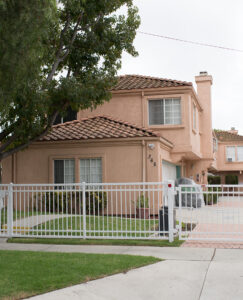
Public schools in West Chula Vista are part of Sweetwater Union High School District or Chula Vista Elementary School District. California's richness in cultural, linguistic, and economic diversity is reflected in Sweetwater Union High School District's (SUHSD) student population, which includes Hispanic, Filipino, African-American, Asian, and other ethnicities. Approximately half of Sweetwater's students speak a language other than English at home.
SUHSD offers unique programs for its students, like free before- and after-school care for middle schoolers. School days operate on block scheduling, and some schools offer International Baccalaureate (IB) curriculum. MAAC Community Charter School ensures a vocational job for those who graduate from their program.
Chula Vista Elementary School District (CVESD) provides a part-time preschool program to low-income families. Parents or guardians may request zone transfers to schools within CVESD or interdistrict transfers to other districts. Transfer requests are generally approved as long as space is available in the school of choice. Transportation is not provided to those who reside outside the school's boundaries.
Chula Vista Elementary School District is a part of a consortium of four other school districts created by the University of Southern California for an initiative called Welcoming Practices. The program recognizes the unique needs of military children in school transitions. It aims to ensure "that district and school staff members have access to the tools they need to create welcoming and effective transition procedures that give students a successful start at their new school." We think this deserves massive kudos!
East Chula Vista
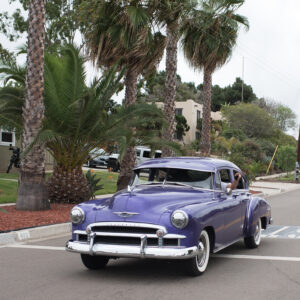 About
About
East Chula Vista, and its many master-planned communities, are very popular with military families. Proximity to downtown San Diego and the many naval bases, highly rated public schools, larger homes, and suburban amenities make East Chula Vista a desirable option for many. The newer section of Chula Vista is east of the 805. Hardly any neighborhoods date back more than 20 years, and the robust HOAs keep the lawns and shared spaces in top condition. There are many parks, trails, bike paths, and dog parks to keep you outside and active. The lakes are a fun way to spend the day with family, but if that’s not your speed, most of the communities have pools and clubhouses. Youth sports are serious business here, and you may recognize a few teams from this area in the Little League World Series. Eastlake, Otay Ranch, and Rancho Del Ray were just a few of the communities that military folks raved about in East Chula Vista.
Highlighted Areas
- Otay Ranch
- Rancho Del Rey
- Eastlake
Homes
East of the 805, you’ll find much larger suburban homes that range in size from 1,800 to 3,000 square feet. Like most master-planned communities, the lots tend to be a little small, and houses can be packed in tight. There are also clusters of townhomes with units in the 1,000 to 1,400 square foot range.
Schools
The public schools in East Chula Vista belong to Sweetwater Union High School District or Chula Vista Elementary School District. California’s richness in cultural, linguistic, and economic diversity is reflected in Sweetwater Union High School District’s (SUHSD) student population, which includes Hispanic, Filipino, African-American, Asian and other ethnicities. Approximately half of Sweetwater’s students speak a language other than English at home.
SUHSD offers unique programs for its students, like free before- and after-school care for middle schoolers. School days operate on block scheduling, and some schools offer International Baccalaureate (IB) curriculum. MAAC Community Charter School ensures a vocational job for those who graduate from their program.
Chula Vista Elementary School District (CVESD) provides a part-time preschool program to low-income families. Parents or guardians may request zone transfers to schools within CVESD or interdistrict transfers to other districts. Transfer requests are generally approved as long as space is available in the school of choice. Transportation is not provided to those who reside outside the school’s boundaries. There are several great schools in East Chula Vista, but one to note is Arroyo Vista Charter School.
Chula Vista Elementary School District is a part of a consortium of four other school districts created by the University of Southern California for an initiative called Welcoming Practices. The program recognizes the unique needs of military children in school transitions. It aims to ensure “that district and school staff members have access to the tools they need to create welcoming and effective transition procedures that give students a successful start at their new school.” We think this deserves massive kudos!
Imperial Beach
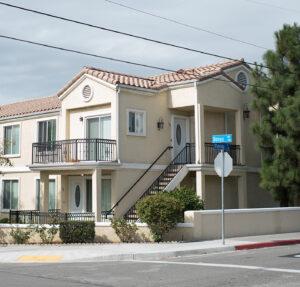 about
about
Imperial Beach is the southernmost beach city in California, just below the southern tip of San Diego Bay. This border town has seen better days, but the best is likely just ahead. Imperial Beach (or “IB” to locals) is experiencing some massive revitalization efforts, primarily due to the impending move of the Navy SEALs from Coronado to a training compound in IB’s front yard. IB is also one of the few remaining beach towns with affordable property, so people are buying houses and tearing them down to rebuild. This renaissance has prompted a lot of new additions to the community, including luxury condos, new restaurants, a grocery store, a skate park, and even a brewery. IB has long been a haven for military and locals alike, but the future will likely see even more military families flocking to the beach!
Highlighted Area
- Sea Village
Homes
Existing homes in IB are aging and small, but developers focus on building larger family-friendly abodes. The home size ranges from 1,200 to 2,400 square feet, with condos and single-family homes. Expect tiny lots as the developers try to cram as many houses as possible into this up-and-coming area.
Schools
Public schools in Imperial Beach belong to Sweetwater Union High School District or South Bay Union School District. California’s richness in cultural, linguistic, and economic diversity is reflected in Sweetwater Union High School District’s (SUHSD) student population, which includes Hispanic, Filipino, African-American, Asian, and other ethnicities. Approximately half of Sweetwater’s students speak a language other than English at home.
SUHSD offers unique programs for its students, like free before- and after-school care for middle schoolers. School days operate on block scheduling, and some schools offer International Baccalaureate (IB) curriculum. MAAC Community Charter School ensures a vocational job for those who graduate from their program.
South Bay Union School District is the most south-westerly school district in the United States. It serves a richly diverse population in Imperial Beach, San Ysidro, and south San Diego. SBUSD offers a robust visual and performing arts program, transitional kindergarten, preschool, and low-cost internet access for those who qualify.
Imperial Beach Charter School is a famous tuition-free charter school.
Bonita
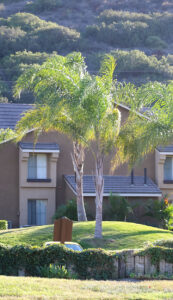 About
About
Bonita is a quiet, pleasant community just north of East Chula Vista. You’ll find older yet well-maintained and renovated homes in this affluent suburb. Think rolling hills, golf courses, and horses to get a sense of the vibe. The Sweetwater River runs right through Bonita, and a reservoir (lake) is nearby. There are back roads that lead into downtown San Diego and 32nd Street, but if you’re commuting via Interstate 5, you will undoubtedly hit some traffic.
Highlighted Areas
- Sunny Vista
- Bonita Highlands
Homes
Homes in Bonita are large and a little more reasonably priced than they would be in, say, North County. The average size ranges from about 1,800 to 3,000 square feet.
Schools
Public schools in Bonita are in Chula Vista Elementary School District. Chula Vista Elementary School District (CVESD) provides a part-time preschool program to low-income families. Parents or guardians may request zone transfers to schools within CVESD or interdistrict transfers to other districts. Transfer requests are generally approved as long as space is available in the school of choice. Transportation is not provided to those who reside outside the school’s boundaries.
CVESD is a part of a consortium of four other school districts created by the University of Southern California for an initiative called Welcoming Practices. The program recognizes the unique needs of military children in school transitions. It aims to ensure “that district and school staff members have access to the tools they need to create welcoming and effective transition procedures that give students a successful start at their new school.” We think this deserves massive kudos!
The Charter School of San Diego (CSSD) is a fully accredited, publicly funded option for students living in Bonita in grades 7 through 12. CSSD uses business principles in managing the school and is committed to creating educational reform models centered on how effective educational organizations run, how teachers teach, and how students learn. Students at CSSD experience the “university model”: they study one or two courses simultaneously and are expected to complete one course every three to four weeks. The school year at CSSD operates year-round, and parents are responsible for transportation.
Looking at relocating?
Enter your information below and we will reach out to help the process.
7 Reasons You Should Consider Buying a Home
1. TAX ADVANTAGES
To encourage homeownership, the IRS has provided many tax breaks for owning a home. Credits may be available for specific home improvements, such as using clean energy or for qualified first-time home buyers. The way most homeowners see those advantages is through income tax itemization and deductions like mortgage interest and real estate taxes.
2. STABALIZE MONTHLY HOME COSTS
Owning your own house is one of the safest bets on stabilizing your monthly home costs. There’s no worry of rent getting increased significantly after each year of living in someone else’s home. Additionally, when you answer to yourself, there is no worry of landlord changes or unexpected lease termination.
3. HOUSE HACKING
Generally speaking, house hacking is a smart strategy that involves renting out a portion of your primary residence as a means of generating income to offset your own living expenses. Think turning your finished basement or mother-in-law quarters into an AirBnB! Or consider purchasing a multi-unit duplex or triplex: live on one side and rent out the other! If your home making money while you’re living in it doesn’t sound like your thing, there’s always renting it out after you PCS as an income generating investment property.
4. Increased Privacy
Generally speaking, house hacking is a smart strategy that involves renting out a portion of your primary residence as a means of generating income to offset your own living expenses. Think turning your finished basement or mother-in-law quarters into an AirBnB! Or consider purchasing a multi-unit duplex or triplex: live on one side and rent out the other! If your home making money while you’re living in it doesn’t sound like your thing, there’s always renting it out after you PCS as an income generating investment property.
5. Pets Are Welcome!
For those who choose to rent instead of buying, it can be extremely difficult to find rentals who allow for your
four-legged, furry friends. Landlords often require hefty pet deposits or place heavy restrictions on the number of pets and breeds they allow—if they will even allow pets. When considering quality of life, including beloved pets and the indoor and outdoor space available to them matters. Having the flexibility to include ALL members of your family as a homeowner is priceless!
6. Pride of Ownership
One of the greatest benefits of owning your own home is the pride of ownership that comes along with it. Not only are homeowners more inclined to take good care of their investment with routine maintenance and cleaning, but also they are free to make design choices ranging from hanging artwork on the walls, to paint colors, to customization of closets, electronics, and more. As military families who relocate frequently, having your home reflect who you really are feels important.
7. Safe and Stable Long Term Investment + Forced Savings
Owning a home has historically been one of the safest, lowest risk financial investments that tends to have long-term stability and success. As your home value appreciates and your mortgage balance decreases, what’s left is growing equity with an eventual paid off home. Making a monthly house payment is akin to setting aside a specific amount each month into a savings account—it’s a little difficult to access in the moment, but over time it can build into something significant in the form of equity.

FIVE RESOURCES TO HELP YOU IN YOUR RELOCATION PROCESS

Your PCS is underway!
The home buying and moving transition process has begun. Now what? If it feels like there are a million things to do, don’t fret because you don’t have to do them all yourself. During the relocation process, there are many service providers that can assist you in making your move a smooth one.
Consider these five resources to help you in the process
1. MOVING COMPANIES
Sure, the military offers transportation and relocation services, but many service members decide to coordinate the transfer of household goods themselves. Not only can you often earn money on the difference between moving costs and weight allowances, but you can be assured that you have more control over your belongings. Services that moving companies offer can range from delivery of boxes and pods for the “you-pack” model all the way to full-service logistics companies that will do all of the packing, loading, driving, and unpacking for you.
2. STORAGE
Whether you need to store your household goods for a few weeks until you close on your home or you decide that you have more stuff than square footage, storage companies abound. Sizes, conditions, and contracts vary widely so be sure to do your homework before you commit. Particularly in climates with extreme cold, heat, or humidity, it is important to consider using only climate-controlled storage to ensure the protection of your furniture and temporarily unused items.
3. TEMPORARY HOUSING
It is not uncommon for there to be a short gap of time during a military move between when you arrive at your new duty station and your new home being available to inhabit. No longer are hotels the only option for sticking out a few days or weeks during the wait. Vacation Rentals by Owner (VRBO) and Airbnb are great options to make you feel more at home while you wait for your home. In fact, why not take advantage of seeing your new city through the eyes of a tourist? Find a location near new local attractions and dining and enjoy a few days of getting to know the lay of the land.
4. USPS/IRS
Once you get settled in at your new home, it’s important that you alert agencies that will make sure your current and up-to-date address is on file. The United States Postal Service (USPS) and the Internal Revenue Service (IRS) are two of the most important and by doing so, any important mail or documents in your name should be forwarded or sent along to your new address. It’s also a good idea to notify banks, credit card companies, and other debt collectors of a change of address. These days nearly all of these transactions can be handled online.
5. DISCARD & DONATE SERVICES
No matter how much you purge, toss, organize, minimize, or donate before you pack up the moving truck, it never fails that after you get unpacked on the other side there seems to be more stuff to declutter. Discard and donate services can help with this. Many are a phone call away and will happily come to your residence for a pickup. Others are structured where you simply drop off at a store. A lot of these services are charitable organizations and will offer you documentation for your own taxes based on your donation. It’s a win-win: you downsize by donating, and someone else benefits from your use of your items.


